By phone or email
To speak to an adviser, please call our free and confidential advice line 0808 801 0366 (Monday to Friday 9.30am to 3pm, excluding Bank Holidays). Or you can ask us a question via email using our advice enquiry form.
Are you a parent, kinship carer relative or friend of a child who is involved with, or who needs the help of, children’s services in England? We can help you understand processes and options when social workers or courts are making decisions about your child’s welfare.
Our advice service is free, independent and confidential.

To speak to an adviser, please call our free and confidential advice line 0808 801 0366 (Monday to Friday 9.30am to 3pm, excluding Bank Holidays). Or you can ask us a question via email using our advice enquiry form.
Our online advice forums are an anonymous space where parents and kinship carers (also known as family and friends carers) can get legal and practical advice, build a support network and learn from other people’s experiences.
Our get help and advice section has template letters, advice sheets and resources about legal and social care processes. On Monday and Thursday afternoons, you can use our webchat service to chat online to an adviser.

The information and advice on this page is for parents and carers. It aims to help you understand what deprivation of liberty means and why social workers may draw up plans to deprive a child of their liberty. This page includes advice about secure accommodation orders and ‘DOLs’ orders made by the High Court. And information about what legal aid might be available to help you access legal advice and representation.
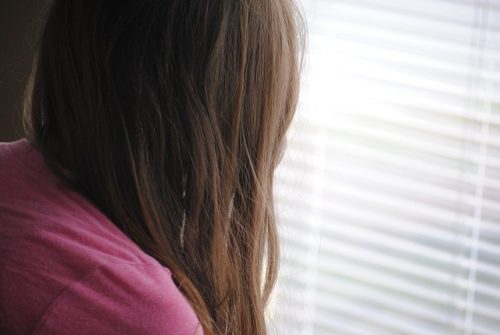
The restriction will be a deprivation of liberty if it is different to a restriction a parent or carer might use when caring for a child of a similar age.
Confining a baby to one room so they can be kept safe by their parent is unlikely to be depriving them of their liberty. But doing this to a 15-year-old is likely to be.
A child is only deprived of their liberty if a public body is doing any of the following:
Children’s social services and the courts are both examples of public bodies.
When children’s social services deprive a child of their liberty, it will normally mean:
Children’s social services can arrange for a child who is looked after in the care system to be deprived of their liberty. Whether this happens, and how, will depend on the precise situation including:
For up to 72 hours in a secure children’s home – no Family Court order required
Social workers from children’s social services have powers they can use to arrange for a child to live in a secure children’s home for up to 72 hours.
This power can be used for a child to live in a secure children’s home for one 72-hour period. Or used for several shorter periods over 28 days.
If the child is under the age of 13, children’s social services must first have the permission of the Secretary of State. This is a senior government minister responsible for the government’s work in relation to children in the care system.
For more than 72 hours in a secure children’s home – secure accommodation order required
To arrange for a child to live in a secure children’s home for more than 72 hours (in a period of 28 days), children’s social services must apply for and obtain a secure accommodation order from the Family Court.
If the child is under 13 years old, children’s social services will need the permission of the secretary of state and the secure accommodation order.
The secretary of state is a senior government minister responsible for the government’s work in relation to children in the care system.
In a setting that is not a secure children’s homes – a High Court order required
The High Court can make an order which allows children’s social services to deprive a child of their liberty in a setting which is not a secure children’s home. The power the court uses to make this type of order is called the inherent jurisdiction. Sometimes people refer to orders made in this way as ‘DOLs orders’ or just ‘DOLs’.
DOLs orders can be made in respect of a child who is under the age of 18.
Yes. All children and adults in the United Kingdom have a human right to liberty (freedom) and a human right to a family and private life. These human rights are set out in the European Convention on Human Rights.
All public bodies must take account of these rights under the European Convention on Human Rights. Public bodies include children’s social services and the Family Court.
These human rights should only be interfered with if it is necessary AND ‘proportionate’. This means children’s services and the Family Court should:

This Human Right is protected by Article 5 of the European Convention on Human Rights. Article 5 and human rights law explains when depriving a child of their liberty will be lawful, including:
If the deprivation of liberty is not lawful then it may be a breach of Article 5. That means the child or adult’s human right to liberty is being breached (broken).

All children and adults have a human right to a private and family life. This is set out in Article 8 of the European Convention on Human Rights. Depriving a child of their liberty can interfere with these rights in different ways including:
Actions and decisions taken by children’s services or the family courts must also take account of the human rights of children which are also protected under the United Nations Convention on the Rights of the Child.
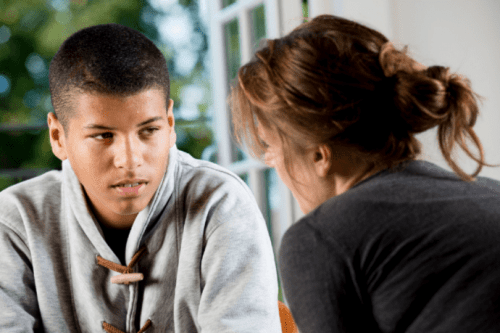
Sometimes it can be hard to know if a child is being deprived of their liberty. This question and answer guide can help if you are a parent or carer and unsure about what is happening. To work out if a child is being deprived of their liberty, it is important to answer all the questions in the guide.
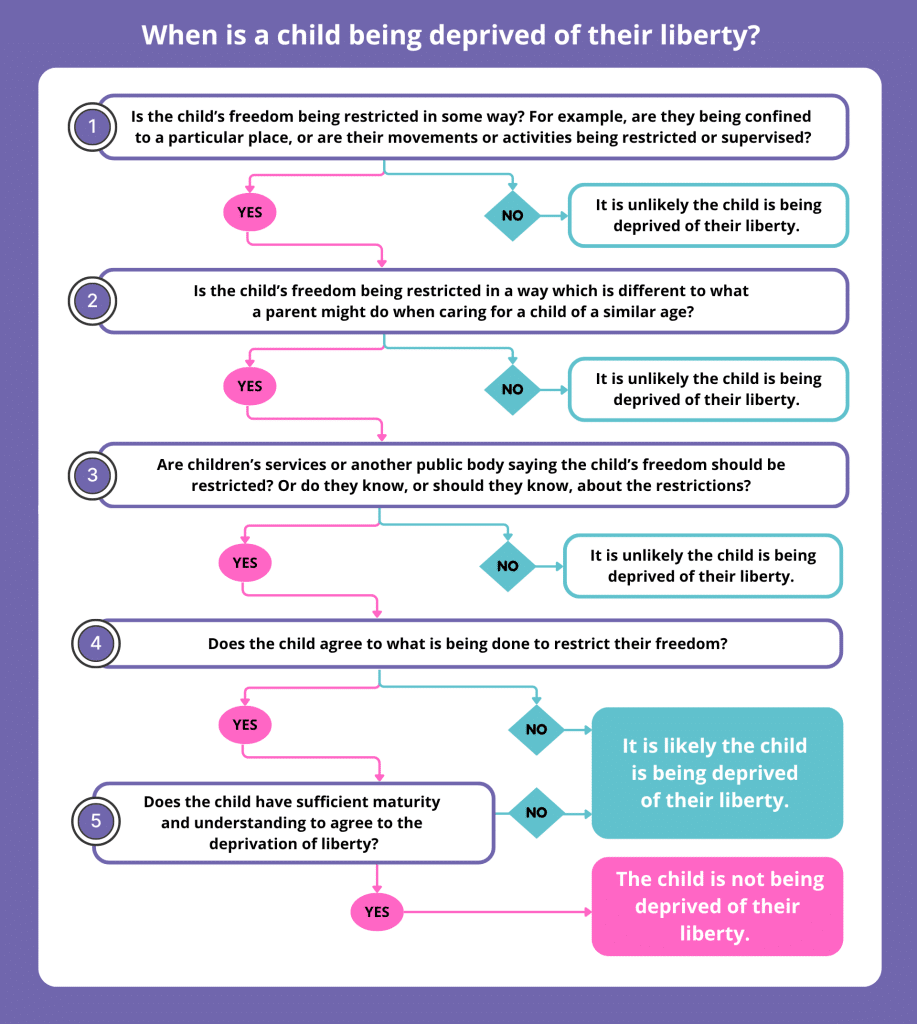 You can download a screen reader friendly copy of this guide using the download button below.
You can download a screen reader friendly copy of this guide using the download button below.

This is the order children’s social services apply for when they want a child to live in a secure children’s home for more than 72 hours. The Family Court’s powers to make a secure accommodation order come from section 25 of the Children Act 1989.
If children’s social services want to deprive a child of their liberty in a setting which is not a secure children’s home they will need a different type of court order.
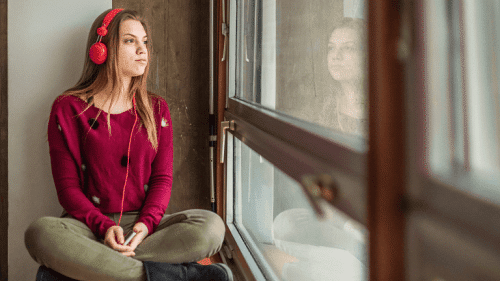
Children’s social services apply to the High Court for a deprivation of liberty order when they want to deprive a child of their liberty in a setting which is not a secure children’s home.
The power the court uses to make this type of order is called the inherent jurisdiction. Sometimes people refer to orders made in this way as ‘DOLs orders’ or just ‘DOLs’.
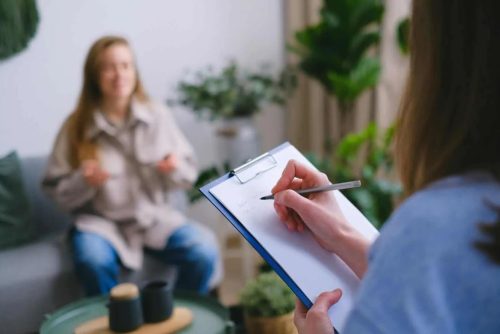
Legal aid is the use of government money to pay for people to receive free legal advice and representation. Legal aid may be available for the family of a child who is deprived of their liberty. And to the child too.

Your donation will help more families access expert legal advice and support from Family Rights Group.
Donate Now